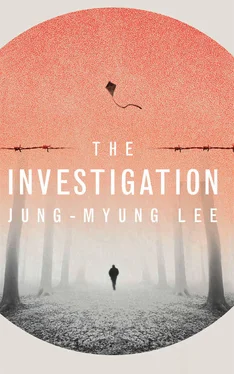In my mind’s eye, I saw a girl carefully working on her blue kite, grinding bits of china to embed onto her line, in the afternoons when she was left home alone. While the other children rushed to the hill near the shore to catch the marine wind, the girl headed to the empty lot near the prison. There, nobody teased her and no bully entwined his thick line with hers. One day, from within the high prison walls, a kite flew up. With it came faint shouts from the other side of the walls, cheering her on. The girl approached the white kite, danced with it and circled the air. She eventually cut the white kite’s weak cotton line and watched as it spiralled to the ground. She hung her first prize on her wall.
Dong-ju’s reclaimed kite smelled faintly of ash and gunpowder. The shaft had broken and the bottom was torn. I flipped the kite over and saw traces of black ink. I could decipher a familiar, careful hand:
To the best kite-fighter in Fukuoka,
Congratulations! Today, you won.
If you’re reading this, you clipped our kite. We tried our best, but we couldn’t beat your power and speed. Or your surprising talent. Since you won, you can take this as your prize. But we’ll make a new kite. Tomorrow we’ll stand off again. Maybe tomorrow we’ll be able to take your kite. Or maybe the next day.
After the winter is over and kite-flying season ends, I’m sure your room will be filled with our kites. Keep them safe. They’re proof that you’re the best kite-fighter in all of Fukuoka.
Who would have known that gentleness was hiding behind Sugiyama’s hard, metallic voice? I wondered how he’d been with those he loved, like the woman he tuned the piano for. Did he listen with all of his being as she played clumsy jazz? Did he drink coffee with her? Did he dream of having soft, peachy babies with her? Could he have been a good husband? A wonderful father? Who had killed him in the end?
I raised my head, realizing that I hadn’t asked the most crucial question. ‘How did you even know all of this was going on?’
‘When the poet gave up writing poems, Sugiyama- san came to me for help. Tuning the piano was only an excuse.’

The golden sunset outside the windows pooled on the piano’s shiny black surface. Midori looked down at Sugiyama’s rough hands, at the knife wounds and the twisted knuckles. She wondered if his hands remembered their victims, then decided that they wouldn’t; they couldn’t produce such beautiful sounds with such brutal memories.
Sugiyama asked her to play something. She began the opening bar of ‘Carry Me Back to Old Virginny’. He closed his eyes, frowning and smiling, revelling in the colour and vibration of each lingering note. He opened his eyes only after the last note disappeared completely. His rough hands came together to clap. ‘Much better. Almost moving.’
The sunset drew red shadows over Midori’s face. ‘The sound?’
‘No, not the sound — the playing. Your playing has become so natural.’ Thick veins bulged in his neck.
To Midori, he seemed angry, but actually Sugiyama was embarrassed. He was ignorant of most emotions. The world had never been gentle to him and he didn’t expect kind treatment; he had wrapped himself in the armour of fury. When he hated something he got mad. He expressed his love and embarrassment in anger, shouted to express sympathy and was brusque when he was showing interest. He was most comfortable with silence.
He placed a hand on the piano and swallowed. ‘I have a favour to ask. I have to find someone outside the prison. ’ He trailed off. As a soldier he had to maintain barracks life, but a nurse was free to come and go as she pleased.
She widened her eyes and looked round. ‘Who?’
Sugiyama couldn’t bring himself to speak for a long time. Then he spoke hesitantly. ‘I don’t know whether it’s a man or woman, or their age or address. Or what they look like. But I know they must live somewhere around here. Every Tuesday someone flies a kite outside the prison walls. Might be young. Supposedly thirteen or fourteen, and lonely.’
‘Who told you that?’
‘Hiranuma Tochu. I mean, Yun Dong-ju. You must know him?’
Midori’s eyes flickered in fright. She not only knew Dong-ju, having met him in the infirmary, but she’d grown to know about his poems and his favourite music. She respected him. She had included ‘Va, pensiero’ in the concert at his suggestion. She hesitated. ‘Has he — done something wrong?’
Sugiyama shook his head. The more he got to know Dong-ju, the more he was convinced that the prisoner had done nothing wrong. He looked down at his thick, calloused hands. ‘He hasn’t written a single line since he got back from solitary. Makes sense. Solitary destroys your body and soul. And while he was in solitary the child flying the kite disappeared.’
‘What do you want me to do?’
‘Tell her to fly her kite again. Tell her she’ll be able to fight us if she flies it right outside the prison.’ He looked out of the window at the golden sunset that was listening in on their clandestine conversation.

‘And a few days later the girl’s kite flew up. This must be the one she cut down that time.’ Midori touched the mangled kite, whose broken shaft and ripped tail contained beautiful memories of soaring in the sky against the wind.
‘So now we won’t be able to see the kite again.’
‘When the war’s over and the girl returns, the kites will fly again.’
‘It was smart of Sugiyama to bring her back into kite-fighting. It enabled him to control the prisoners effectively.’
‘Sugiyama- san didn’t bring her in for that,’ Midori shot back. ‘What he sent over the walls weren’t kites. They were poems.’
A stray cat came up to the window. I could hear its footsteps crunching on the snow. ‘What do you mean?’
She explained Sugiyama’s ruse. He’d had Dong-ju write poems and fly kites; he brought the girl into the fight as part of an intricate plan to smuggle Dong-ju’s poems out of the prison. ‘Sugiyama- san had a deal with Dong-ju. He would allow Dong-ju to write poems in Korean if he recited them in Japanese. Sugiyama- san became his audience. When Dong-ju recited his new poem in Japanese, Sugiyama would write it down and then use that paper to make a kite. Dong-ju didn’t know that. But his kites would often fall outside the prison, releasing his poems into the world.’

All winter Dong-ju read his poems out loud in the interrogation room and Sugiyama wrote them down as though he were taking down a confession. The poems Dong-ju recited were dark but glorious, steeped in sorrow but brimming with joy — they sang of a wanderer’s thoughts as he walked down a dark snow-covered road, a man suffering in a strong tempest, a young scholar betrayed by the times. His poetry illuminated the darkness briefly, line by line. Sugiyama copied it all down. He was the first to hear the young poet’s new work, poems that had formed in Dong-ju’s head over weeks or months, poems previously unknown to the world.
The poems flew up like doves on the belly of Sugiyama’s kites. They leaped over the walls with the breeze. The kite danced and circled in the blue sky in tandem with the girl’s kite waiting on the outside. The prison’s feeble kite, cut by the girl’s glass-studded line, tilted in the wind and sank. The girl chased after the kite as it took off sluggishly over the fields. Often the kites disappeared from the girl’s sight and became stuck inside a thorny bush, fell in mud or ended up in a narrow, dirty alley. The girl looked all over for the missing kites until, late in the evening, she found them impaled on an electric pole in the harbour or torn and wet on the sandy beach. She discovered clumsily written poems on the back of the creased kites and, upon returning home, hid them deep in her cupboard.
Читать дальше













